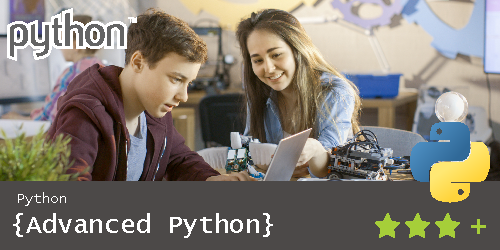Advanced Python
Students who have completed the Python Foundation classes (Python 101, 102, and 103) and Python Perfect series can now apply their knowledge in our in-depth electives by choosing an area which interests them. From Artificial Intelligence to Data Analytics, Game development and more, a smorgasbord of choices await our coding connoisseurs. Students may complete the courses here in any sequence they like.
 Be ready for Big Data
Be ready for Big Data
Big data is now the buzzword. The advent of Internet and availability of cheap data storage had caused an explosion of data. Governments and Corporations are constantly looking into turning these data into information and finally into decisions. Having the skills to develop algorithm to process, analyse and manipulate data is now highly valued.
In this course, students will first be introduced to the fundamentals of database design. Students will learn about the relational database model and apply design principles to create databases applicable to real life situations. Students will combine SQLite, a popular database engine module in Python, with other Python modules they have learnt to perform data processing and analytics. They will see the application of this skills in areas such as Finance, Bioinformatics, Supply Chain and Marketing.
 Create human-like programs
Create human-like programs
Ever wondered how Siri was programmed? Want to learn about the self-driving cars which is poised to replace all drivers in the world? Students will learn the fundamentals of Artificial Intelligence and Machine Learning. How it is possible to make computers learn. How we model learning and how we can develop a simple AI.
In this course, students will learn the fundamental components that makes an Artificial Intelligence. Students will be introduced to Machine Learning concepts, the statistical techniques to give computer systems the ability to “learn” with data. Students will use Pandas, a popular module in Python used for data analysis and machine learning, to analyse real world data and train their own basic learning system.
 Take Your First Step Into The World Of Automation
Take Your First Step Into The World Of Automation
An Algorithm is essentially the brains behind a computer program. It is a process or set of rules to be followed in calculations or other problem-solving operations, especially by a computer. Algorithms perform calculations, data processing, and/or automated reasoning tasks. In essence, students’ to understand and develop algorithms to solve problems is critical and would be highly valued in the future world of automation.
In this course, students develop an in-depth understanding of algorithms. They learn to analyse algorithms and develop an appreciation of an efficient algorithm. They will also learn the key algorithms commonly used in programming.
 Turn your gaming passion into a career
Turn your gaming passion into a career
Have a passion for games? Ever wondered about what goes on behind a good game? Our introductory course will bring students through the various components of Game Development. Starting from learning about the basic concepts of Game Design, to analysing games with the elemental tetrad (Mechanics, Aesthetics, Story, and Technology), and finally, to creating basic games with Python game libraries.
In this course, students will learn to appreciate the work behind popular games, and combine their Python programming skills with game design principles to create their own games. Students will learn to use Pygame, a popular cross-platform set of Python modules designed for creating video games.
Combining Design with Technology
Do you frequently shop online? Ever wondered about what goes on behind the creation of sites such as Shopee, Lazada or Sephora? This course will bring students through the various components of Web Development. From appreciating the beauty of using the right fonts and colours to designing the page structure, students will learn client side web programming and apply their newfound HTML/CSS/Javascript knowledge to develop websites or web apps that are fluid, interactive and responsive.
Combining Design with Technology
Used by Instagram, Mozilla, and Facebook, Django is a popular high-level web development framework. Packed with features that constitute a developers dream, many have used it to create sites that are chock a block with essentials and extras, ranging from databases, to a secure user-authentication system. After this course, you too can build your own e-commerce, social media or music streaming site (Yes, Spotify uses Django too!)
 Learn to predict the future
Learn to predict the future
Mankind has always been obsessed with predicting the future. No one can claim to have the ability to accurately predict the future, but with the advent of Mathematics and computers, we have equipped ourselves with a tool that makes us more accurate than before. Computer simulation models are used in a huge range of fields such as Financial Trading, Weather Forecasting, War Simulation, Supply Chain Management and Road Infrastructure design.
In this course, students’ knowledge on Math and Probability will be expanded. They will be introduced to famous mathematical and computer simulation models, such as the Monte Carlo method. Students will learn how to use Python modules designed for scientific computing, such as NumPy and Matplot, to build mathematical and computer simulation models of real world systems.

Advanced Python
Data Analytics, A.I, Algorithms, Game Design...

for inquiries please
